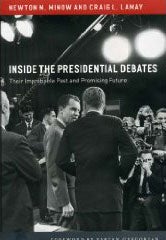Four days before the first 2008 presidential debate takes place in Mississippi, a panel discussion at HLS looked at past, present and future presidential debates.
The panel, moderated by Dean Elena Kagan ’86, included former Massachusetts Governor Michael Dukakis ’60, Democratic nominee for the presidency in 1988; Newton Minow, former chairman of the FCC, and co-founder and vice chairman of the Commission on Presidential Debates; Ellen Hume, research director of MIT’s Center for Future Civic Media; and Northwestern journalism professor Craig LaMay.
Discussion ranged widely from the history of the first presidential debate between Kennedy and Nixon in 1960 to the frequent omission of third party candidates to whether the process includes enough opportunity for public participation.
There was general consensus among panelists that debate is the last chance for candidates to speak in direct response to each other and for the electorate to see candidates perform in unscripted moments.
“Debates are exceedingly important. … Debates give all of us in this big country, 300 million people, the opportunity to share a common experience,” said Minow, who recently co-wrote a comprehensive history of the debates, “Inside the Presidential Debates,” with LaMay.
“For all the shortcomings of the American presidential campaigns, this is the one place where the rest of the world does seek to emulate us,” LaMay said.
Hume expressed concern that debates have become about culture, and not policy, and recalled her frustration when, as a political correspondent for the Wall Street Journal, she found it increasingly difficult “to let the facts matter.”
She believes the emergence of the Internet and new media, such as YouTube and blogs, has the potential for expanding opportunities for greater public participation in political discourse—she cited Al Gore’s plan to broadcast close to real-time Twitter messages, or “tweets,” from viewers during the debates on his Current TV network. Fact-checking sites, such as Factcheck.org and PolitiFact, she says, have also made it more difficult for candidates to misrepresent facts.
Dukakis acknowledged squandering an opportunity during a 1988 debate to champion his record on crime. “I was asked by [Bernard Shaw] whether or not if [my wife] was either murdered or raped, would my view of the death penalty change? Now if you’re against the death penalty, you’ve been asked that question at least a thousand times. Unfortunately, at least from a public standpoint, I answered as if I had been asked it a thousand times, and gave a kind of policy response, but not a lot of emotion. … I just did a terrible job of dealing with an issue which should have been mine, because I’d done a lot on the crime front around here and I was rather proud of what we’d done.” While he believes debate provides opportunity to counter dirty campaign tactics, he says it can be difficult to know how best to respond to race-based tactics. The McCain campaign, he says, is using the same race-based tactics this election that were used against him during his presidential run, when a commercial featuring convicted murderer Willie Horton portrayed Dukakis as soft on crime.
Referring to a recent McCain commercial claiming Barack Obama received economic advice from Franklin Raines, former CEO of the recently bailed out mortgage lender Fannie Mae, Dukakis said the commercial is designed to appeal to racist impulses, saddling two black leaders with responsibility for the financial market woes. “That’s just a deliberate attempt to put two African-American faces in a commercial, bound together by a lie, and run it … how do you respond to this kind of stuff?”
While all panelists agreed the process is imperfect, there wasn’t consensus on ways to improve it. Dukakis championed the idea of Nine Sundays, an idea that came out of a Kennedy School Forum, proposing that every Sunday night during the fall, public television, cable networks and at least one of the three major networks would present a 90-minute campaign program.
An estimated 180 million people worldwide are expected to watch the debates, according to LaMay.
